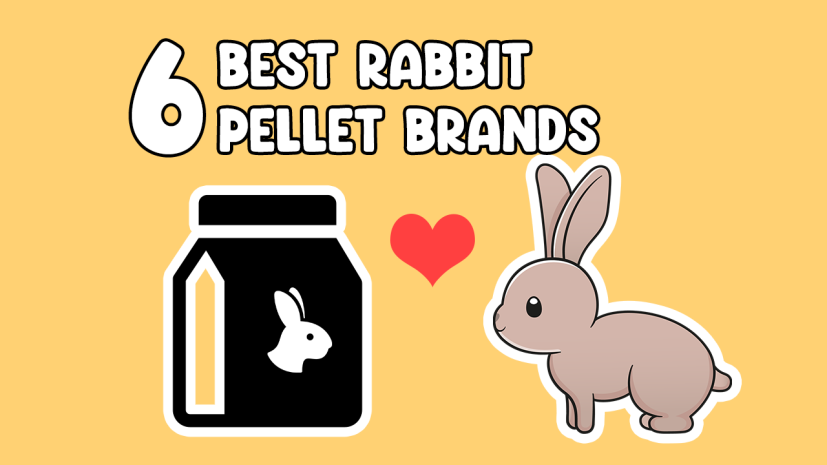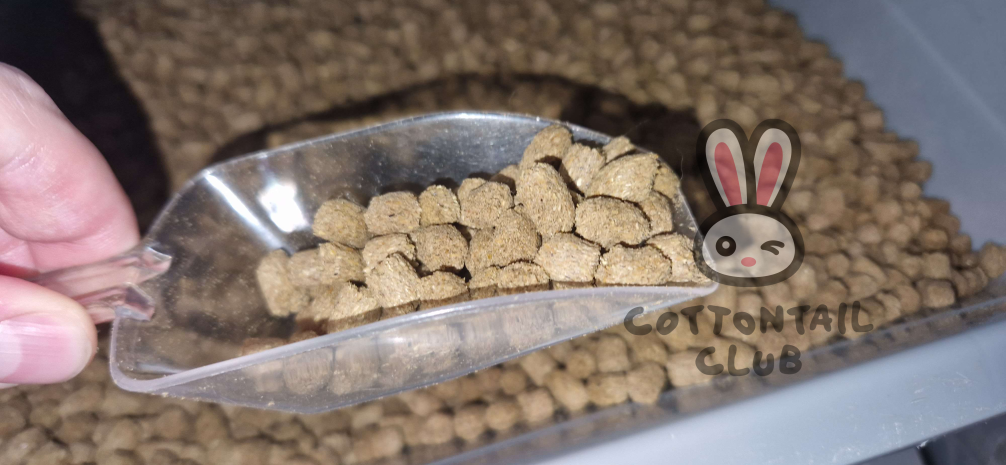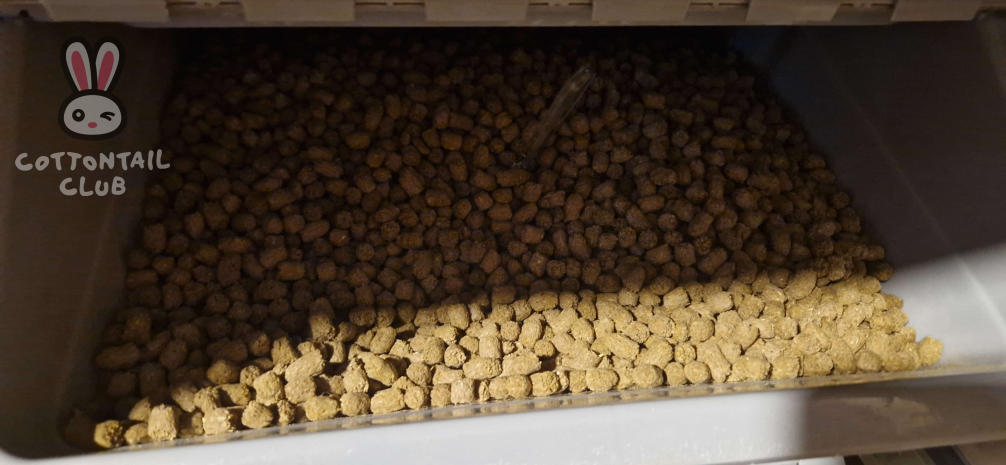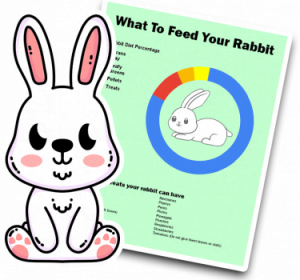
Are you looking to provide your beloved rabbit with the best possible nutrition? Look no further! In this article, we will explore the world of rabbit pellets and unveil the top 5 options that will meet your furry friend’s dietary needs.
When it comes to choosing the best rabbit pellets for your furry friend, it can become incredibly overwhelming as they all boast to be the most nutritious brand or blend. Finding the best rabbit pellet doesn’t have to be complicated.
When it comes to choosing the best rabbit pellets for your furry friend, it can become incredibly overwhelming as they all boast to be the most nutritious brand or blend. However, finding the perfect rabbit pellet doesn’t have to be a complicated task. We’re here to simplify the process and guide you toward the best choice: the Oxbow Essentials Rabbit Pellets.
If you’re unsure how many pellets your rabbit should be consuming, check out our free-to-use Pellet Calculator, which provides pictures of how many pellets to put in your rabbit’s bowl.
Rabbit pellets are a type of feed that forms a vital part of the diet for domestic rabbits. Formulated from predominantly plant-based ingredients, the chief components usually include alfalfa meal and wheat middlings. Rabbit pellets are compact, nutrition-dense food sources designed to meet the nutritional needs of your pet rabbit.
Besides these base ingredients, rabbit pellets can also contain additional supplements such as vitamins and minerals to promote the overall health and longevity of the rabbit. These feed pellets offer several benefits, such as promoting healthy digestion, providing essential fiber, and supporting healthy skin, fur, and teeth.
Understanding the dietary benefits of rabbit pellets not only helps you cater to your pet’s nutritional requirements but also aids in ensuring their overall well-being.

| Name | Protein | Fiber | Calcium | Fat | Price |
|---|---|---|---|---|---|
| Sherwood Rabbit Food | 11% | 28% – 33% | 0.4% – 0.9% | 4% | High |
| Oxbow Adult Rabbit Food | 14% | 25% – 29% | 0.35% – 0.75% | 2% | Medium |
| Oxbow Essentials | 14% | 25% – 29% | 0.35% – 0.75% | 2% | Medium |
| Small Pet Select Rabbit Food | 14% | 25% – 29% | 0.4% – 0.6% | 2% | High |
| Oxbow Garden Select | 12% | 22% – 26% | 0.35% – 0.75% | 2.5% | Medium |
| Supreme Science Selective | 14% | 25% | 0.6% | 4% | High |
| Kaytee Forti-Diet | 12% | 18% – 23% | 0.3% – 0.8% | 2.5% | Low |
| Higgins Sunburst Gourmet | 13% | 18% – 22% | 1.2% – 1.5% | 2% | Low |
| Mazuri Rabbit Food | 14% | 18% – 22% | 0.65% – 1.15% | 1.5% | Medium |
| Kaytee Supreme Rabbit Food | 15% | 12% – 17% | 0.5% – 1% | 2% | Low |
| Kaytee Fiesta Natural | 14% | 11% – 16% | 0.3% – 0.8% | 4% | Medium |
As previously discussed, fiber is a critical part of your rabbit’s diet, making up at least 20% of their nutritional intake. This helps to prevent GI tract issues and promotes a healthy gut biome.
Looking at the data, the rabbit pellet brands with the highest fiber content are Sherwood Rabbit Food (28% – 33%), Oxbow Adult Rabbit Food (25% – 29%), Small Pet Select Rabbit Food (25% – 29%), and Oxbow Garden Select (22% – 26%). These brands ensure your rabbit gets a healthy dose of fiber in their diet.
Note: Rabbit Hay is known to have quite a large quantity of fiber. As such, you should ensure your rabbit has access to unlimited hay as they will maintain their fiber intake.
Fat should comprise about 3% or slightly less of the rabbit’s pellet diet. It’s a vital energy source with essential functions that help prevent illness and generate hormones that help the rabbit’s brain function correctly.
The brands with the lowest fat content, ideal for rabbits, are Mazuri Rabbit Food (1.5%) and Higgins Sunburst Gourmet (2%). These brands ensure your rabbit gets the necessary fat without overdoing it.
Protein should make up 12-14% of a rabbit’s diet. It’s essential for maintaining muscle mass and helping your rabbit fight off infections and heal from injuries.
The brands within this ideal range are Oxbow Adult Rabbit Food, Oxbow Essentials, Small Pet Select Rabbit Food, Kaytee Fiesta Natural, Supreme Science Selective, and Mazuri Rabbit Food, all with 14% protein.
Calcium is important for your rabbit’s bone health. The ideal range is around 0.5-1.0% calcium content.
The brands that fall within this range are Supreme Science Selective (0.6%), Kaytee Supreme Rabbit Food (0.5% – 1%), and Mazuri Rabbit Food (0.65% – 1.15%).
While the carbohydrate content isn’t explicitly listed for these brands, ingredients such as hay, barley, wheat, soy, and oats indicate a good source of complex carbohydrates. All brands listed contain some form of these ingredients.
Carbohydrates are vital to a rabbit’s diet as they provide the energy needed for various bodily functions and activities. They are the body’s primary energy source and are crucial for maintaining an active and healthy rabbit.
Two types of carbohydrates are important in a rabbit’s diet: simple carbohydrates and complex carbohydrates.
Simple Carbohydrates: These are sugars that provide quick energy. However, they should be limited in a rabbit’s diet as they can lead to obesity and other health problems if consumed excessively.
Complex Carbohydrates: These are found in vegetables, fruits, and grains. They are broken down more slowly by the body, providing a steady energy source. They also contain fiber, which is crucial for a rabbit’s digestive health.
In a rabbit’s diet, the focus should be on complex carbohydrates. These provide a steady source of energy and help maintain a healthy digestive system due to their high fiber content. Foods like hay, barley, wheat, soy, and oats are good sources of complex carbohydrates.
Rabbits require a balance of certain vitamins to maintain their health; these vitamins play various roles in the body, from supporting vision to aiding in absorbing other nutrients. Here’s a closer look at some of the key vitamins that should be included in a rabbit’s diet:
While these vitamins are essential, it’s important to note that rabbits can produce many of their essential vitamins within their body or by eating their cecotropes, a type of feces that rabbits typically reingest.
| Brand Name | A (6000 IU – 10000 IU) | D (800 IU – 1200 IU) | E (40-100 IU) |
|---|---|---|---|
| Sherwood Rabbit Food | – | – | – |
| Oxbow Adult Rabbit Food | 10000 | 900 | 190 |
| Oxbow Essentials Rabbit Food | 10000 | 900 | 190 |
| Small Pet Select Rabbit Food | 8650 | 450 | 86 |
| Oxbow Garden Select | 10000 | 900 | 190 |
| Supreme Science Selective | 20000 | 2000 | – |
| Kaytee Forti-Diet | 2500 | – | – |
| Higgins Sunburst Gourmet | 16000 | – | – |
| Mazuri Rabbit Food | 8000 | – | 30 |
| Kaytee Supreme Rabbit Food | 1000 | – | – |
| Kaytee Fiesta Natural | 4000 | – | – |
While vitamins are crucial for a rabbit’s health, an excess can be harmful. This is because some vitamins are fat-soluble, meaning they are stored in the body’s fatty tissues and liver, and are not easily excreted. Over time, these vitamins can accumulate to toxic levels if the rabbit consumes too much.
For example, consuming too much Vitamin A can result in Vitamin A toxicity. This condition can trigger a variety of health issues, such as skin disorders, neurological complications, and inhibited growth.
Rabbit pellets comprise several ingredients, each with a specific nutritional purpose. The primary ingredients, as mentioned, are alfalfa meal and wheat middlings, both plant-derived products.
Alfalfa meal, a type of forage, is used due to its high fiber content, which is essential for healthy rabbit digestion. Wheat middlings, a by-product from the wheat milling process, are included for their protein, fiber, and mineral content.
Other common ingredients include soybean meal, a protein source, and corn, which provides energy. Calcium and phosphorous are often included for bone health, while salt and trace minerals fulfill necessary dietary requirements.
By understanding the ingredients in rabbit pellets, you can be confident about what you’re feeding your pet and ensure its nutritional needs are met.
Like any food product, there can be variations in the formulation of rabbit pellets. These variations largely depend on the brand, the intended life stage of the rabbit (whether it’s for young rabbits, adults, or seniors), and any specific health considerations.
Some brands may choose to add or subtract ingredients based on nutritional analysis. For instance, pellets for younger rabbits might be higher in protein to support their growth, while those for adult rabbits might be higher in fiber to aid digestion. Some pellets might also include added vitamins and minerals to boost health benefits.
Understanding these variations can help you choose the right pellet for your rabbit, tailored to their specific needs.
Each rabbit has a different preference, so rating these pellets based on my rabbit’s choice isn’t work. As such, we will compare the nutritional value, smell, and texture, adding an approval rating to each of the pellets based on those metrics. If these foods don’t contain nutritional details, we will source them as best as possible and note them in the comparisons.
It’s worth noting that many pellet brands must provide a minimum and maximum nutritional value for varying elements. As such, we will be counting this at a minimum value rather than a maximum value, as many rabbits will have additional nutritional input from fruit & vegetables but this shouldn’t take them too far over if they’re having healthy portions of pellets.

Rabbit pellets offer numerous nutritional benefits to your rabbits. Here are some key advantages:
High-quality rabbit pellets are formulated to provide a balanced mix of essential nutrients. They contain a proper ratio of fiber, protein, fats, vitamins, and minerals required for your rabbit’s optimal health.
Rabbit pellets are hard and crunchy, which helps promote dental health. The chewing action required to consume the pellets helps wear down rabbits’ continuously growing teeth and prevents dental issues.
The high fiber content in rabbit pellets supports proper digestion. It aids in maintaining a healthy gut and prevents gastrointestinal problems such as stasis or diarrhea.
Controlling your rabbit’s weight is essential for their overall health. Rabbit pellets provide a controlled portion of food, making it easier to manage your rabbit’s weight and prevent obesity-related health problems.
When selecting rabbit pellets, consider the following factors:
Rabbits have different nutritional needs depending on their age and life stage. Look for pellets specifically formulated for your rabbit’s age group, whether it’s young, adult, or senior rabbits.
Opt for rabbit pellets with a high fiber content. Fiber is crucial for proper digestion and maintaining a healthy weight.
Choose pellets that are free from artificial colors, flavors, and preservatives. Natural and organic options are generally a better choice.
Select pellets from a reputable brand known for producing high-quality rabbit food. Check reviews and recommendations from fellow rabbit owners or consult with a veterinarian for guidance.
There are a few misconceptions surrounding rabbit pellets that need to be addressed:
While rabbit pellets are an essential part of a rabbit’s diet, they should not be the sole source of nutrition. Rabbits also need a variety of fresh vegetables, hay, and occasional treats to maintain a well-balanced diet.
Feeding unlimited pellets can lead to overeating and obesity. It’s important to control portion sizes and offer a balanced diet to your rabbits.
Rabbit pellets are suitable for all rabbit breeds. However, choosing pellets specifically formulated for your rabbit’s age and life stage is essential.
No, controlling portion sizes is important, and not overfeeding your rabbits. Follow the feeding recommendations provided on the packaging or consult with a veterinarian.
Sticking to one brand of rabbit pellets is generally recommended to maintain consistency in your rabbit’s diet. Mixing different brands may cause digestive upset. However, we also mix pellets, especially when introducing new pellets into your rabbit’s diet.
Yes, rabbits can benefit from having pellets in their daily diet. Pellets provide essential nutrients and help ensure your rabbit receives a well-rounded and balanced diet. However, it’s important to note that pellets should not be the sole source of nutrition. Rabbits also require a variety of fresh vegetables, hay, and occasional treats to maintain optimal health.
The quantity of pellets to feed your rabbit can vary depending on their age, weight, and overall health. As a general guideline, adult rabbits typically require around 1/4 to 1/2 cups of pellets daily.
We also have a Pellet Calculator that allows you to input their weight, showing you a visual representation of how their pellet bowl should look.

By entering your email address you agree to receive emails from Cottontailclub. We'll respect your privacy and you can unsubscribe at any time.